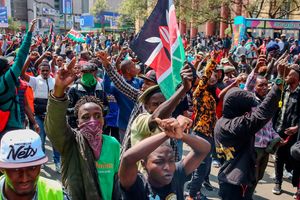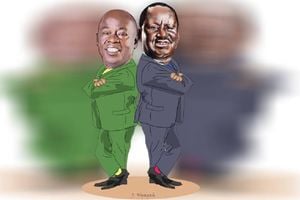
NARC Kenya leader Martha Karua (centre) leads a Kikuyu dance with other Mt. Kenya leaders during the Limuru 3 meeting at the Jumuia Conference Centre in Kiambu on May 17, 2024.
The Limuru III Conference that was convened last week, just like the past two, was themed under the banner of discussing the interests of Mount Kenya region.
On the face of it, the meetings sound benign to an outsider. However, to a Kenyan, it is something that is quite divisive, tribal and intimidating to smaller ethnic communities, given the fact that they are led by senior government officials.
Nobody is suggesting that government officials should not congregate with their kith and kin—or tribesfolk, for that matter. It is the political angle that these Mt Kenya caucuses take that begs the question as to why Cabinet ministers—including the Deputy President of the Republic of Kenya, no less—spearhead the interests of their community when they are in office to serve all Kenyans.
Government offices are occupied by government officials. It sounds a very simplistic way to describe them but that is exactly what they are there for. The core reason is that the officials appointed or elected into government offices are meant to serve the interests of all Kenyans—indiscriminately—and the country within the time they occupy those positions.
Individualistic interests
The tendency to use government resources such as cars and aircraft, as well as time and money, to propagate individualistic interests, on a personal and tribalistic level, seems to be the norm when, in fact, they amount to abuse of office. Taxpayers are only meant to foot the bill for officials on government duty, working for public interests, not when they run personal errands and tribal causes and courses.
The oath to protect the Constitution and to serve the public is what all government and State officials took. A Cabinet secretary shall “assume office by swearing or affirming faithfulness to the people and the Republic of Kenya”, states Article 152 (4)(a) of the Constitution. It doesn’t say a CS should assume office to serve Mt Kenya or whichever other region or their tribesfolk!
Limuru III was for Mt Kenya region to balkanise for the next elections, due in 2027. There is more than three years to go. The interests the politicians alluded to was on getting the largest share of the ‘national cake’ and how to assume power.
The “one man, one vote, one shilling” talk has reared its ugly head again as Mt Kenya totters towards the elections. That can only benefit the larger communities—such as those from Mt Kenya, Rift Valley and western Kenya—who have bigger populations that can deliver on the principle.
In a country such as Kenya, however, the one man, one vote principle is problematic as there are areas that are sparsely populated and will be disadvantaged. It’s an inequitable way to distribute public resources. The smaller communities will have little or no say on political and socioeconomic policies as they are outnumbered by their more populous counterparts, who will hold sway over them.
Still in government
The Mt Kenya congregations are being led by some Cabinet members, who should have nothing to do with organising such conferences while still in government. Tribal conferences show the danger of appointing career politicians as ministers. The current government is awash with such and hardly any professionals matching the roles they play in the ministries they head.
They are in government for a reason and a season. But the risk they pose is that they have no focus on the job at hand even if they have the qualifications to run the ministry. This is because they are distracted by political affiliations and the need to serve their communities, political masters and parties rather than the country.
The Limuru conferences harbour tribal and divisive undertones that can tilt the landscape in favour of hate and division rather than love and unity. It is also the causal effect of tribal feuds. We can’t ignore the tribalism-inspired political divisions that led to the election violence in 2007/8.
Politicians, like all humans, are what they say. If they think in a tribal, hateful way, that is just who they are. The Limuru and other tribal conferences by the bigger ethnic communities is a drip-drip effect of division, hate and greed to benefit a single community or region.
What, then, becomes of the rest of the country’s 50 million or so people? Let us not forget also that there are other significant groups, apart from the smaller Kenyan ethnic communities, that have no representation. They include people from other African countries who recently became Kenyan citizens, such as Makonde, expatriates who have made Kenya home, Europeans and Indians.
However, for whatever reason, the National Cohesion and Integration Commission (NCIC) is, yet again, watching a social time bomb in the making. But the NCIC doesn’t have to wait until tribalism gets out of hand and leads to violence and deaths among communities and then issue knee-jerk statements and threats that would hardly scare the politicians.
NCIC must be proactive when it comes to dealing with hate and division by being tough on tribal political gatherings and politicians advancing such agenda. Tribal conferences must be outlawed in Kenya for the sake of unity, peace and security.
Ms Guyo is a legal researcher. [email protected]. @kdiguyo










